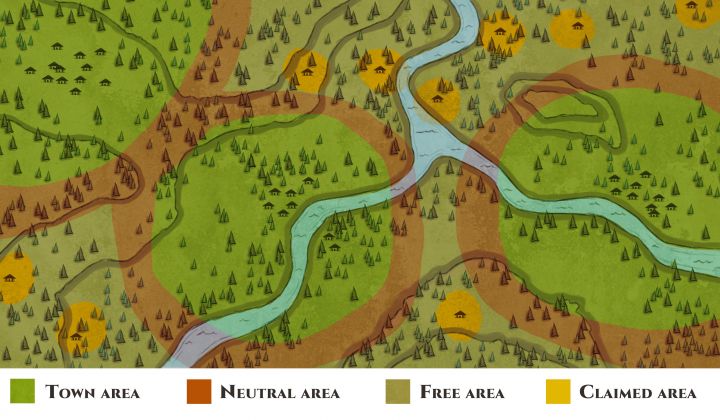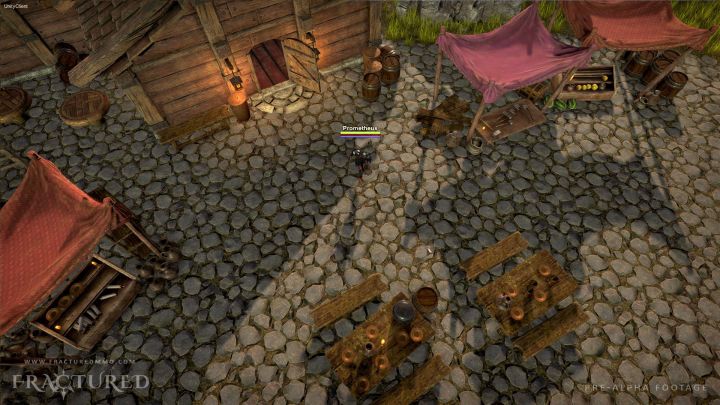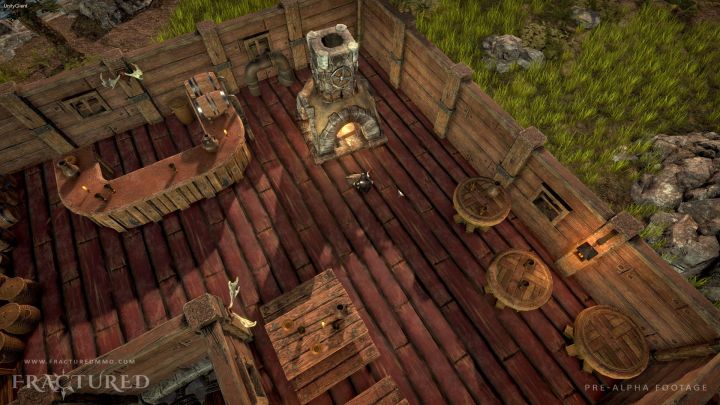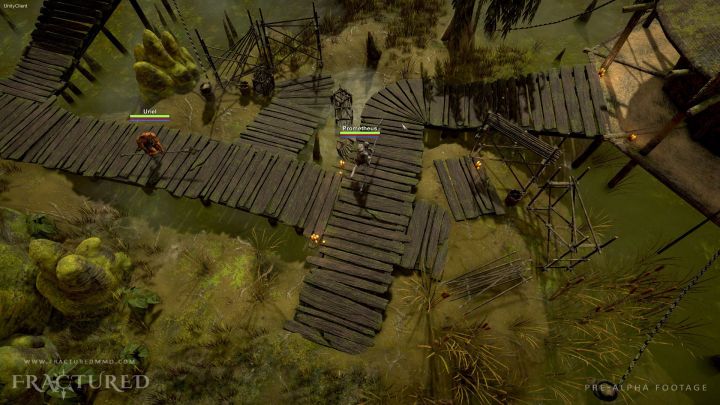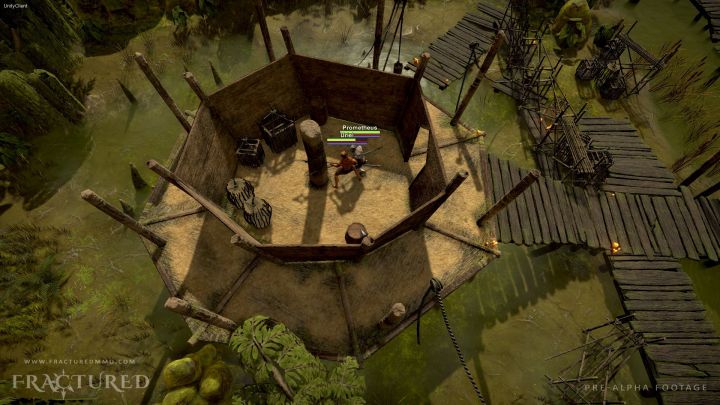Feature Spotlight #7 – Towns, Governors & Politics
July 20th, 2018 at 12:08 amThe most awaited spotlight has arrived. Will you be a lone wolf, an engaged citizen, or a powerful ruler? Discover your social destiny in Fractured!
Hi, fellow gamer and MMO enthusiast!
Yes, the time has come. The spotlight many of you have been waiting (way too long) for, is finally here.
Ladies and gentlemen, it’s player-made towns time! Let’s kick the article off with a summary for those of you who don’t feel like tackling this “demanding” reading!
SUMMARY
In Fractured, having a base of operation is something really desirable for all players. As with all our features, we don’t want to exclude any part of our userbase from enjoying the game, and that’s why we’re giving everyone plenty of options on how to live their social life.
In the system we’re building, lone wolves can claim their own lot of land outside of a town, where they can build a home, basic crafting stations, cultivations and livestock. More social players can instead band together and start a settlement, or join an existing one.
The most ambitious players can become the elected leaders of a free town through politics, or autonomously rule one connected (and dedicated to) their guild.
Getting a Governor pack from our Kickstarter campaign is a great idea to get a head start as a Governor of a town on a planet and location of one’s choice, freely choosing whether that’s going to be a free town or a guild town.
Objectives & Issues
A sound housing system is pretty much mandatory for a proper sandbox MMO. However, it is often a problematic feature to manage. I’m sure many of you recall the world of a sandbox classic like Ultima Online, covered with player houses positioned wherever there was enough room to lay foundations.
A couple common solutions adopted to prevent player housing from destroying environments are:
- Totally oversize worlds. It works, but it has the downside of making maps uninteresting.
- Instanced housing. This also works, but is a total immersion breaker in our opinion, and ultimately makes player housing a minor pastime.
Housing alone is an enjoyable feature that adds a lot of fun for the player – but with Fractured, we want to do much more. We want to allow you to bring back civilization from the ashes of Elysium by colonizing worlds in a realistic, meaningful way. We want to create towns that are alive and a core component of everyday gameplay, not only places for social gathering.
Following is a brief list of our goals when developing the system:
- Players should be able to be self-sufficient even without being part of a town…
- …but being a citizen of a town should have obvious advantages over living on one’s own.
- Towns should be a crucial point of contention for guilds…
- …but Guild Masters should not be the only people who matter in the political landscape. Town rules and citizens should matter as much, if not more.
- All-out war (aside from Arboreus) should always be an option…
- …but not the only one, as commonly seen in the MMO genre.
Yes, there’s a lot to explain here, so much that we have to split the topic into multiple spotlights.
In this one, we’re focusing on the structure of the world map, the basics of town progression, guild towns vs free towns, and town politics (Governors and elections).
World Areas
The surface of each planet (Syndesia, Arboreus and Tartaros) is logically divided into four different zone types – town areas, free areas, claimed areas and neutral areas, as shown in the picture below.
Town Area
A town area is a pre-defined area of the map where a village or city used to exist on Elysium in the days before the Fracture. It can be reclaimed by players to fund and develop a new settlement.
Plenty of town areas exist on each planet. If abandoned, they are typically haunted by monsters and studded with ruins. More specifically, the ruins of a town hall can always be found close to the center of a town area.
While by default town areas are haunted and unclaimed at the start of a new server or a new testing phase, two notable exceptions exist:
- NPC towns. There are only a handful of them on each planet, which serve as starting locations and hotspots for new players. They feature basic facilities that cater to the basic needs of players and can’t be conquered. Starting in an NPC town is not mandatory – you can always choose for your character to be created in a player-run town if authorized to do so.
- Governor packs. If a player has pledged on Kickstarter as a Governor (or higher), he/she is able to choose a town to rule on before the server starts. When the server starts, the town is already claimed and ruled by the Governor.
Players are not allowed to build freely within the boundaries of a town area that is haunted or that contains a town with an elected governor. More on the topic in the following chapter.
Free Area
Free areas are portions of the world where players can freely build their home. Building a home in a Free Area turns a small zone surrounding the house into a Claimed Area, where the owner can start cultivations, place basic crafting stations, etc.
Building a home in a free area guarantees total freedom, but also comes with some risk (if on Syndesia or Tartaros). While player buildings can’t be destroyed and cultivations can’t be pillaged by strangers, players with malicious intent can still enter claimed lots, which lack the partial protection from crime granted by guards in town (or the total protection offered by a Good-aligned town on Syndesia).
Claimed Area
As mentioned above, a claimed area is the zone around a player house built in a free area. Other players can enter it but can’t build in it.
Just like in town, player buildings in a claimed area require maintenance to prevent the house at the center from decaying, which frees up the area to be claimed by a new owner. This maintenance can be carried out by the owner and co-owners of the lot or by a Carpenter NPC. Most Kickstarter pledges offer free carpenter NPC contract time – from 3 months in the Pioneer pack, to lifetime in the Immortal pack!
Neutral Area
Neutral areas are areas of the map where all kinds of player buildings are forbidden. They’re usually located around the borders of a village area, around dungeons and around other important world locations.
Town States
Now that we’ve explained what town areas are, let’s see how the progression – and regression! – of a town works in Fractured.
Hamlet
“Rome wasn’t built in a day“, the well-known adage says. Indeed, even Rome, in its very early stages, was likely just a small bunch of houses without proper organization and rule.
When a town area has been cleared of the creatures infesting it, any player can place the foundations of a house in one of the few dedicated lots of land in the area. Once at least one house has been fully built, a hamlet – and a citizen! – are born.
A hamlet has no rulers and no rules. As we’ve just said, anyone who can settle on a planet can add his own house to a hamlet on that planet. No specialized structured can be built in it – only residential buildings.
If all the citizens of a hamlet leave the settlement or let their homes decay, the area becomes a haunted place once again.
If, on the opposite, a hamlet grows large enough, any citizen can present himself as a candidate for the role of Governor. Once the elections take place and a winner emerges, the hamlet can finally transition to a full-fledged town.
Town
A town is a settlement ruled by a Governor, whose powers are going to be described later in this article.
The most important metric of a town is its prestige counter, based on the number and types of buildings it contains, and the contributions of its citizens to civic life.
The prestige progression of a town in any given week compared to the previous one causes it to be tagged as Decaying, Stable, or Thriving. Total prestige can earn the town the title of Village, Town, City and Metropolis.
Not all town areas are large enough to allow the town to gain the City or Metropolis status. When a town gains a new title, everyone on the planet is notified to celebrate!
If the prestige of a town and the number of active players living in it decrease too much, the Governor is automatically ousted, and the town reverts to a hamlet.
All the owners of a Governor pledge pack start at the head of a settlement that is already considered a town, even if initially empty. They are given enough time to find players to join their town before it turns into a hamlet – although doing some planning before a new testing phase or a new server launch is still a good idea. To help all governors in this effort, we’ve created a dedicated forum section!
Town Politics
Let’s examine town politics now, first by outlining the difference between a Free Town and a Guild Town, then analyzing the powers of Governors and the way the political game plays out in Free Towns.
Free VS Guild Towns
A guild town is a settlement directly connected to a guild. It differs from a free town in that the Governor has absolute powers, and is not subject to citizens’ scrutiny through elections, although they can take place in exceptional circumstances.
A free town is a settlement where the power ultimately lies in the hands of the people. Free towns are also ruled by a Governor, but he/she is missing the key power to kick out a citizen from the town at will, and can be ousted by the people through elections.
A guild town can be turned into a free town at any time by its Governor. If the Governor is not the Guild Master of the connected guild, the latter has to approve the change. On the contrary, a free town can be turned into a guild town only through a vote of approval of 2/3 of its citizens. When a hamlet qualifies to become a town, it becomes a free town by default, unless its citizens decide otherwise.
Owners of a Governor pledge pack are free to choose whether they want their town to be a free town or a guild town. Once the choice has been taken and the town assigned to the Governor, the rules exposed above apply.
Governors
The Governor is the one and only ruler of a town.
The powers of a Governor are vast, but not unlimited. A few worth mentioning are:
- Shaping the layout of the town (by positioning lots of land, roads, defenses, etc.)
- Deciding the purpose of lots of land (residential, NPC shop, etc.)
- Setting the purchase price of residential lots of land
- Accepting the application of foreigners who want to become citizens of the town
- Ban a citizen from the town and confiscate his property (in free towns, that’s subject to a vote of approval of 2/3 of the eligible citizens)
- Deciding the tax rate applied to people and shops in town
- Managing the town’s coffers – withdrawing, depositing and spending money
- Managing tributes the town pays to guilds, if any
- Giving orders to the town’s militia (for defense and patrolling purposes)
A Governor can always assign the power to carry out some of the tasks above to a third person – not necessarily a citizen of the town itself. In guild towns, the Guild Master can take away some powers from the Governor, such as that to accept or ban citizens.
The Governor of a town can be forcibly removed from power in two ways:
- By vote, through elections, if the town is a free town
- By force, through a town conquest, if on Syndesia or Tartaros
Since the whole war topic is out of the scope of this spotlight, let’s focus on the former.
Elections
Ah, democracy. So important in our real lives, yet somehow forgotten in the MMO genre. Here at Dynamight, we believe the time has come to bring back some!
An election cycle can be triggered in the following ways:
- In free towns, if 21 days have passed since elections were last held
- In guild towns, if the governor changes or leaves the guild (on purpose or because he’s been kicked out)
- In all towns, when the Governor’s account becomes inactive for a long time, without an assigned delegate
It consists of the following phases:
- Candidacy. All eligible citizens of a town can present themselves as potential candidates for the role of Governor. To be admitted as candidates, they must gather sufficient support from citizens. The current Governor is automatically made a candidate, unless he decides not to run for a new term. This phase lasts for 2 days.
- Campaign. It’s debate time! This phase lasts for 3 days.
- Elections. All eligible citizens vote for their favorite candidate. This phase lasts for 2 days.
If after the first phase there is only one candidate, he is automatically made the new Governor of the town. If there are no candidates, the town remains unmanaged and new elections are triggered after 7 days. An unmanaged town tends to lose prestige and wealth very quickly, so be careful!
One last thing to notice. You might have noticed the word “eligible” being used from time to time in the article. It refers to the fact contributions to the prestige of a town are tracked for each citizen. A minimum level of contribution every month is required for the citizen to vote, and more to become a candidate.
That’s it for today. What a spotlight!
As always, let us know what you think of this update and let’s keep the support for our Kickstarter campaign going strong. We’re 85% funded and the final push is coming. We can make it happen!
Latest News
-
6/16 Developer Livestream Recap
June 20th, 2025 at 6:14 am -
06/17 Developer Update Livestream
June 12th, 2025 at 6:24 am -
Community QnA – 6/3/25
June 4th, 2025 at 5:11 am -
Developer Update – Environment Style and Character System
May 29th, 2025 at 11:32 am -
Fractured Online – Community QnA
May 21st, 2025 at 7:38 am

